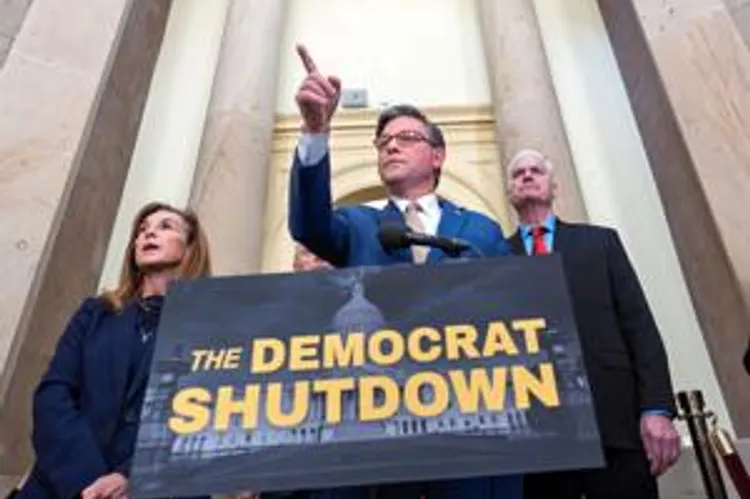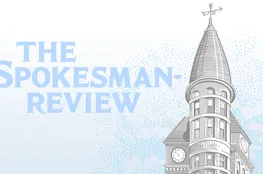NEW YORK — Army veteran Samuel Port couldn’t believe what he was reading in his latest weekly newsletter emailed from the U.S. Department of Veterans Affairs. It blamed Senate Democrats for the federal shutdown, saying they were blocking a stopgap bill to fund the government "due to unrelated policy demands." It then listed various disruptions to veterans’ resources. The Capitol is illuminated at sunrise to begin day three of a government shutdown, in Washington, Oct. 3. In Port’s view, the finger-pointing was inappropriate from a federal agency and lacked the context that Republicans, too, could have taken steps to keep the government funded. He said it eroded any remaining trust he had in the VA to offer services without a political agenda. "This blatant propaganda being spat out was astonishing," said Port, a Virginia-based volunteer for the progressive advocacy organization Common Defense. "Then the astonishment turned into just anger that we're being politicized like this." Port is among a growing number of Americans whose routine interactions with the federal government this week have been met with partisan messaging. The rhetoric, popping up in bright-red webpage banners, email autoreplies and social media posts, lays blame on the political party that is out of power in Washington when both sides are refusing to accommodate the other. Democrats, who have minorities in both the U.S. Senate and House, have demanded that a set of expiring health insurance tax credits be extended before they sign on to any deal. Republicans, who need several Democratic votes in the Senate, said those negotiations should wait until after the funding measure passes. Experts say the communication strategy from across the federal government reflects how aligned President Donald Trump’s entire administration has become in targeting his political opponents. Far more partisan than the straightforward alerts that typically grace agency websites during shutdowns, the messages are in keeping with Trump’s pattern of requiring loyalty and obedience at all levels of government. "There’s really been a consistent and sustained effort to try to pull the entire bureaucracy in sync with what the president wants," said Don Kettl, a professor emeritus and former dean of the University of Maryland School of Public Policy. "The big risk here is that it erodes the fundamental trust that people have in government’s ability to be impartial." Speaker of the House Mike Johnson, R-La., and GOP leaders, from left, Rep. Lisa McClain, R-Mich., and Majority Whip Tom Emmer, R-Minn., blame the government shutdown on Democrats during a news conference at the Capitol in Washington, Oct. 2. Several government websites blame Democrats
Many internet users noticed the first political postings from government agencies on Tuesday, before the shutdown began. The website of the U.S. Department of Housing and Urban Development displayed a message warning that "The Radical Left are going to shut down the government and inflict massive pain on the American people unless they get their $1.5 trillion wish list of demands." That afternoon, employees across the federal government reported receiving messages from their agencies noting Trump’s general opposition to a shutdown. It’s difficult to know with certainty how many federal agencies and departments are promoting the partisan language across websites, social media accounts and email messages. Of the 15 executive departments in Trump’s Cabinet, at least 10 posted messages this week that blamed Democrats or the "radical left" for the shutdown on their official websites or social media accounts. The Small Business Administration’s website placed its message in a red banner that took up the entire screen on a smartphone. It said actions from Senate Democrats are preventing the agency "from serving America’s 36 million small businesses." Other websites, including that of the Food and Drug Administration, told visitors that mission-critical activities would continue "during the Democrat-led government shutdown." Several other federal agencies and departments maintained politically neutral messages, noting simply that there might be delays in services or updates because of the lapse in funding. Employee out-of-office messages are changed
At the Department of Education, out-of-office email messages were reset Wednesday with language blaming Democrats for the shutdown. "On September 19, 2025, the House of Representatives passed H.R. 5371, a clean continuing resolution," the message said. "Unfortunately, Democrat Senators are blocking passage of H.R. 5371 in the Senate which has led to a lapse in appropriations." Some employees tried to change it to something nonpartisan only to see it reverted, according to an employee who spoke on condition of anonymity for fear of retribution. The White House isn’t shying away from the politics, displaying a by-the-second ticker on its website adding up the length of time for which "Democrats Have Shut Down the Government." Concerned citizens calling the White House comment line on Wednesday also heard a political voicemail message. In the recording, press secretary Karoline Leavitt repeats Trump’s false claim that Democrats forced the government shutdown fight because they want to fund health care for illegal immigrants.
Could the messaging violate federal law? Ethics watchdogs said the political messages from government agency websites and emails exceed the level of partisanship they have seen in the past from the civil service. Multiple experts said the messages also violate a 1939 law called the Hatch Act, which restricts certain political activities by federal employees. Kathleen Clark, a government ethics lawyer and law professor at Washington University, said they are "designed to prevent federal employees from using their official positions to advance a particular political cause." She added, "The Hatch Act has been enforced for decades, and violations can result in severe penalties, including termination." Port echoed this sentiment, stating, "It’s about maintaining the integrity of the government and ensuring that decisions are based on facts, not political agendas." Get Government & Politics updates in your inbox! Stay up-to-date on the latest in local and national government and political topics with our newsletter.
























